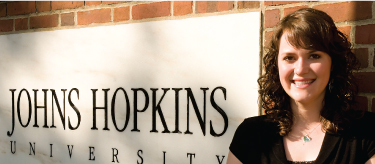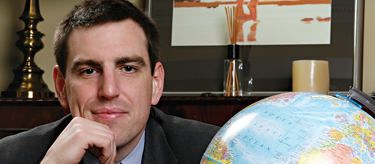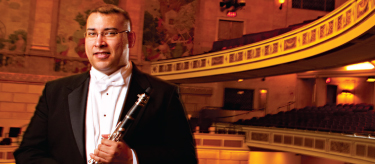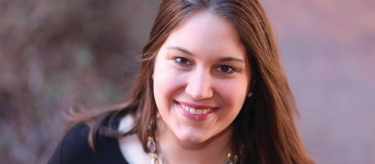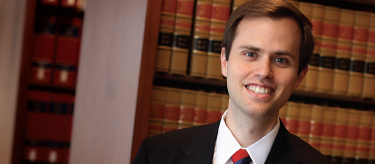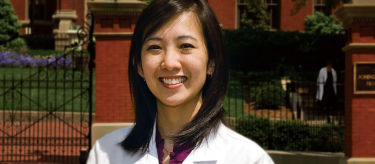Oh, The Places You'll Go!
Jamie Gianoutsos, BA '06, could never have predicted her life's work would be guided in part by a plate of pimiento peppers in a noisy, dim, Spanish pub. As she chased the fiery vittles with swigs from her water glass, she marveled at the company she shared in the equally fiery Spaniards at her table, who didn't appear to notice their propensity for drowning out the Gallego folk music with a passionate debate on the war in Iraq.
"This was Spain," she wrote in a personal essay that would eventually earn her one of the most prestigious scholarships in the U.S. "Leaning across an old, wooden table in that smoky pub, I might not have appeared to be fascinated by the quest for the ideal society, the fight for rights or the idea of citizenry, but these are the very questions that led me to Spain."
Pro Ecclesia. Pro Texana
It's inscribed on the seal of the oldest university in Texas, and its simple purpose--For Church. For Texas.--is rarely more evident than in students like Gianoutsos, now Gianoutsos-Jordan following marriage to her Baylor sweetheart. And while for society in the mid-1800s the borders binding the Lone Star State may just as well have been the ends of the earth, Baylor's mission is alive in 2010 in its best and brightest--in the kinds of scholars, leaders and servants who know no borders in their societal involvement.
Gianoutsos-Jordan in 2006 became Baylor's second-ever and first undergraduate recipient of the Marshall Scholarship, a prestigious award given annually to outstanding American students who wish to study in the United Kingdom. Through her extensive involvement in Baylor student government, Alpha Chi Honor Society, Kappa Kappa Nu (the Medieval honor society she founded and led as president), Habitat for Humanity and a host of classroom accolades, Gianoutsos-Jordan was perfectly aligned not only to fulfill her personal goals through the Marshall but to be a world-class representative of the university, community and state from which she hailed.
"Applying for a scholarship like the Marshall was as much an exercise in soul-searching as it was in presenting oneself," she says, describing her scholarship essay that underwent no fewer than 12 drafts. "When I was overseas I had the opportunity to befriend a number of inspiring individuals who expanded my horizons and encouraged me likewise to passionately pursue a cause or goal."
Gianoutsos-Jordan, one of just 43 exceptional young leaders chosen from 968 nationwide Marshall candidates that year, went on to earn two degrees in the U.K., one each from Queen's University and Cambridge University and both with the highest achievable mark for undergraduate distinction. The dual degrees complement her summa cum laude Baylor degree, where she double-majored in political science and great texts. She is now a pursuing a doctorate in history at Johns Hopkins University, where her research is focused on the debate over the definition of liberty. Among the desired outcomes of her theses are to promote purposeful, deliberate civic participation in the political process, volunteer activities and church work. She hopes one day to teach the liberal arts, a pursuit, she says, that "allows us to consider and be moved by justice, art, beauty, truth, goodness--those things that make us human."
Baylor's influence at an impressionable time in her development, she adds, was among the most critical factors shaping her ambition.
"I learned as much outside of the classroom as I did within," she reflects. "Some of my most fruitful conversations in college came ... over a cup of coffee with a [Baylor] professor. I want to be an academic who takes both faith and reason seriously. So often scholars believe that intellectuals should outgrow God. As a Christian academic, I hope to challenge this view in my day-to-day interactions, as well as in my scholarship. I feel especially passionate about this goal after studying at Baylor."
Aiding Neighbors Around the world
When asked to name his proudest accomplishments to date in an already distinguished career track, the 20-something James Griffin, BA '03, chuckles, "I'll answer in about 30 years."
The Rotary World Peace Fellowship (RWPF) recipient credits his green and gold background, from volunteering as a freshman for Steppin' Out to his senior year study abroad program in Argentina, for not only his world travels but his world perspective.
"From Waco to South America, I began to see many of the problems and much of the need in the world," he says. "I began my studies, like many students, with a clear path laid out in front of me. But over the years, professors provoked me with questions and thoughts that would change my life, the way I viewed the world and the track I would take."
Griffin's 2006 fellowship to learn about and embrace a true global community began quite appropriately, even with a bit of frustration. Working in Ecuador as a Peace Corps volunteer at the time of his nomination (each RWPF applicant is first nominated by a local Rotary Club), he found the logistics of completing a complicated, extensive application process both ironic and rewarding.
"Living in the mountains away from a large city, without a vehicle and with no Internet service, poses a number of challenges," he says. "From bus rides to the city to working on essays and interviewing with Rotarians on Christmas vacation [in the U.S.], I certainly gained a new appreciation for having multiple modes of communication at one's fingertips."
The RWPF program, like the Peace Corps, invests its time and resources primarily into various global peace initiatives. Through his fellowship, Griffin earned a master's degree from England's University of Bradford and went on to the program's applied field experience by way of an internship with the U.S. Mission to the United Nations in Geneva, Switzerland. Griffin also secured experiences with the International Committee of the Red Cross, the Department of State's Office of Refugee and Migration affairs, and the United Nations High Commissioner for Refugees (UNHCR). He now works for PricewaterhouseCoopers improving the fiscal effectiveness of federal agencies in relation to the American Recovery and Reinvestment Act. In dealing with the financial risks of billions of dollars committed to new projects and programs, Griffin hopes to do his part in assisting the country's economic recovery by guiding taxpayer funds "in the most efficient and transparent manner to serve the American people."
Griffin's drive to follow his passions all over the globe has grown in him a genuine compassion and understanding for true relativity. Reflecting on the spirit that connects people around the world, Griffin recalls a humorous moment with the UNHCR. While in a meeting with several influential officers as well as U.S. diplomats, Mother Nature caused an unexpected interruption.
"As we were sitting and discussing program efforts around the world, an incredible summer storm blew into Geneva," he explains. "We were on the top floor and could see lightning strike all over the city. Then, a sudden BOOM of thunder rang out, and everybody in the room nearly jumped out of their chairs! We all got a brief laugh, and there was something unique about getting to see our shared humanity, especially in places of such power and influence."
A Texan in Paris (France)
As power and influence go, Victor Chavez Jr., BMED '06, will never forget the gold-embossed envelope that arrived in the mail at his tiny Parisian apartment, nor the glamorous New Year's Eve party to which the envelope summoned, complete with exquisite china, flawless crystal and a six-hour, multi-course meal served amidst plenty of animated French conversation.
"It all happened out of coincidence, but it turned out to be a very good one," Chavez says of the nine-month excursion that was never part of his life plan.
The death of a dear friend and fellow Baylor student early in his college years affected him "in a big way, to the point I stopped functioning for a time and almost went on autopilot," Chavez explains. At the recommendation of another close friend he decided to try for the Fulbright Scholarship, an international exchange program designed to "increase mutual understanding between the people of the United States and the people of other countries." Once immersed in the application process, Chavez realized his first challenge would be simply to speak and understand French, a language he hadn't studied in nearly five years.
"Baylor equipped me in every possible sense for what I was trying to do," he says of the process. "In three weeks' time I had to turn out a proposal and all the paperwork, not to mention become proficient in French. I was working 40 hours per week at the time as well as taking night school classes to get ahead. With the help of many Baylor faculty, I was able somehow to make it all work."
While in Paris, the former Baylor music major studied under arguably the most celebrated clarinetist of his time, Guy Deplus; lectured at a local arts high school; met several important international diplomats; and worked toward his primary goal of completing an extremely ambitious and extensive thesis on the history of the world's two primary clarinet systems. He also developed a close circle of friends, took dancing lessons, and even found an American restaurant that served fluffy, chocolate chip pancakes and Dr Pepper.
"Even some of my American friends looked at me funny when I ordered ice cream to make a Dr Pepper float," he laughs. "But it kept me connected; it made Paris feel like home."
And while he's no longer an American in Paris, in a sense Chavez has become a Parisian back here at home.
"There's a very good analogy someone once told me," he says. "In the U.S., when you go to see a show and the curtain comes down on the finale, Americans are already asking 'What's next?' But in French and European culture, the smallest things can survive. They don't ask what's next; they enjoy it for as long as it can possibly last."
Chavez is currently enrolled at Eastman School of Music in one of the most academically challenging doctoral programs in the nation. He puts in full days perfecting his training as a teacher and his research, along with his multi-faceted performance abilities in solo, chamber and orchestral music, in hopes of one day earning a teaching position at a university, perhaps to instruct--or become--the next Deplus. But, he practices a strict policy of never taking work home and instead dedicates much of his personal time to enjoying the simple things in life such as the outdoors, and intentionally appreciating and maintaining the good health for which, he says, too many young people take for granted.
"While I went to France to open myself to another culture, I feel like I got even more than I gave," Chavez says. "My mother demanded a college education, and Baylor demanded a sense of duty to service. It always amazes me that at the moment you decide to start giving, you start getting back more than you ever thought possible."
Public Servants
Baylor hit a hot streak in the early 2000s with a trifecta of consecutive Truman Scholars. The Harry S. Truman Foundation annually honors outstanding students who display proven leadership in public service. Skye Perryman, BA '03, earned a spot on the 2002 Truman class role, an elite group of 64 scholars handpicked from a highly credentialed, supremely competitive applicant pool of 590 candidates representing 287 colleges and universities.
"Baylor was a huge part of helping me begin to think about how to make public service a part of my life, for all of my life," Perryman says. "The emphasis Baylor puts on teaching and on professors having meaningful relationships with their students and my involvement in the Baylor Interdisciplinary Core (BIC) had a great impact on my worldview and on my life."
Perryman, who grew up in Waco and graduated high school at 16, thrived in the challenging atmosphere Baylor provided her young, but already well-developed, mind. In addition to her work with BIC, at Baylor she led a program for at-risk school children through the university's GEAR UP initiative.
"During my years at Baylor I discovered that law is a profession where many of my interests intersect," she says. "It is a place where philosophy, my first love, meets practicality."
Perryman worked for a nonprofit organization after completing her Baylor degree and went on to law school at Georgetown, from which she graduated in 2007. She continues her commitment to public service as an attorney in Washington, D.C., where some of her pro bono clients as a litigator at Covington & Burling LLP, one of the nation's most prominent firms for pro bono work, have included Guantanamo Bay detainees, a victim of domestic violence and two African-American men purported to have been terminated from their place of employment due to race. She also received a certificate of recognition from the Supreme Court of Louisiana for her work aiding Hurricane Katrina victims.
"I would tell Baylor students to press themselves and take advantage of every experience Baylor has to offer," she says. "Learn as much as you can from the people around you. Take classes that are difficult. And then, give back by in turn helping the next Baylor student succeed."
And Perryman did just that. Along with a support team of influential professors and administrators, she helped mentor then-Baylor junior John Hill to earn his own Truman Scholarship in 2003, marking the first-ever consecutive Truman winners out of Baylor.
"Baylor offered me numerous opportunities to take on responsibility and exercise leadership," says Hill, BA '04, a former student government officer. "Surrounded by extraordinary mentors who personally invested in my growth, I was able to develop a strong civic awareness and commitment to doing my part to help my neighbor, whoever or wherever that neighbor might be."
Inspired by the Truman Scholars Leadership Week, held in Missouri each summer for the current Truman class, Hill embraced the global implications of the Truman's core mission to develop public servants.
"Simply put, without the Truman, I would not have gotten into Harvard Law School," Hill says. "I would not have spent time working in London for the European Bank of Reconstruction and Development. I would not have traveled to the Chinese border with North Korea to meet North Korean refugees or seen firsthand the unspeakable poverty of rural Haiti. I would not have entered into an extraordinary community of friends who are changing their cities and states and who are making a difference around the world."
A year later, Kristin Kan, BA '05, became the third Baylor student in a row to earn a Truman Scholarship--but that's not the only thing she has in common with Hill. The pair also co-founded the One Book, One Waco reading program that still today unites the Waco community in open dialogue to not only promote reading but build a sense of community and social responsibility.
Kan applauds Baylor and the Truman for giving her a healthy level of "constructive confusion" that led to her completion of a master's degree in public health (MPH) at the Johns Hopkins Bloomberg School of Public Health. Having recently completed interviews for her pediatric residency, Kan explains her very focused purpose in tackling an additional degree in the middle of medical school.
"My hope is that my training for an MPH will guide my involvement in community advocacy for children's health issues," she says. "From dental care to safety issues to family relationships, these are the things that are and should be on the minds of physicians. I want to be involved in the broader, even global, changes that we, as doctors, can make."
Their extraordinary, God-given intellects united Perryman, Hill and Kan through Truman Scholarships. But, says Kan, it is the heart of the university's purpose that keeps their lamps burning, though time and distance has long since separated these Baylor grads from each other and the school that formed them.
"I want to be sure I keep my promise to do my part in public service," Kan says. "That's something Baylor planted in all of us, I think. It is the answer to the essential question, 'What are you passionate about?' I'm so proud to be part of a university that has always prompted students to consider careers that grow leaders and allow us to make positive change in our country and the world."
